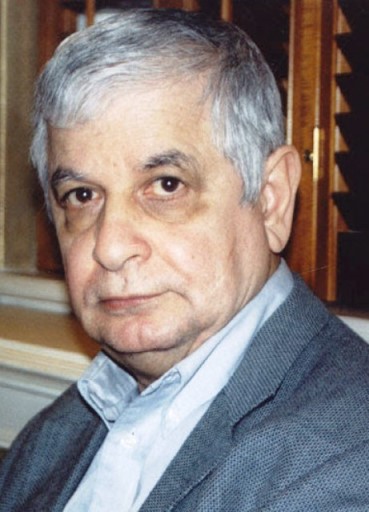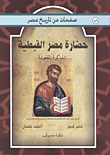Ahmed Osman is an Egyptian-born author. He has put forward a number of theories, some revisionist in nature, about Ancient Egypt and the origins of Judaism and Christianity.
Born in 1934 in the Cairene district of Abdin, Osman was educated at Al-Khedewiya School and the University of Ain Shams, where he read law. After graduation he worked as a journalist, first with Akhbar Al-Yom, which he joined as a young trainee. Yet, even though journalism offered a secure career, Osman preferred the far less certain vocation of playwrighting.
His first play, The Sin of a God, was inspired by Greek mythology. A Zeus-like god falls in love with a human who bears him a son who is an amalgam of god and man. His second play, Rebel in the Harem, resembles the tales of One Thousand and One Nights . His Sheherezade incites a rebellion in the harem resulting in the mass release of the concubines.
His third play, Where is Paradise?, borrowed liberally from Exodus. The moral of the story? Had the Israelites accepted Egypt as their homeland they would have lived happily ever after.
Osman's four plays have never been staged in Egypt. A fifth, Hollow in the Sky, was performed at London's Little Theatre Club in 1967. His controversial books, though, have been far more enthusiastically received.
In December 1964 Osman left Egypt for good. He first moved to Paris then to London where he studied Egyptology.
Hypotheses:
His first hypothesis was that Joseph was the father-in-law of Amenhotep III, Yuya. In 1987 this claim provided the basis for his first book, Stranger in the Valley of the Kings.
Osman identified the Semitic-born Egyptian official Joseph with the Egyptian official Yuya, and asserted the identification of Hebrew liberator Moses with the Egyptian pharaoh Akhenaten.
Ahmed Osman has also claimed that Moses and Akhenaten were the same person, supporting his belief by interpreting aspects of biblical and Egyptian history. He alleges that Atenism can be considered monotheistic and related to Judaism, and includes other similarities, including a ban on idol worship and the similarity of the name Aten to the Hebrew Adon, or "Lord". This would mesh with Osman's other claim that Akhenaten's maternal grandfather Yuya was the same person as the Biblical Joseph.
A number of Osman's positions are in conflict with mainstream Egyptology, including conventional Egyptian chronology. Some Egyptologists have gone as far as rejecting them as unacademic conjecture while others do not consider them worth refuting.[1][2][dead link] Donald B. Redford wrote a scathing review of Stranger in the Valley of the Kings for Biblical Archaeology Review in which he wrote "The author treats the evidence as cavalierly as he pleases. He presents himself as a sober historian, yet when it suits him, the Biblical evidence is accepted at face value and literally... When the Biblical evidence does not suit Osman, it is discarded."
In his Christianity: An Ancient Egyptian Religion (2005), Osman claims that Christianity did not originate in Judea but is the remnant of an Ancient Egyptian mystery cult that was suppressed and transformed by the Roman authorities.
He also argues that Jesus was not Jewish but was actually the Egyptian Pharaoh Tutankhamun and that there was no Joshua, just a confusion between the names Jesus and Joshua: "Up to the 16th century, when the Old Testament books were translated from the Mesoretic Hebrew text into modern European languages, Jesus was the name of the prophet who succeeded Moses as leader of the Israelites in Egypt. Since the 16th century we started to have two names, Jesus and Joshua, which confused people into the belief that they were two different characters".
Osman states that the reason mainstream Egyptologists do not accept his ideas is because "Egyptologists have established their careers on their interpretations" and that to accept other theories could give them less authority.
Books
Stranger in the Valley of the Kings: Solving the Mystery of an Ancient Egyptian Mummy (1987) ISBN 0-06-250674-9
Alternate edition: Stranger in the Valley of the Kings: The Identification of Yuya as the Patriarch Joseph (1988)
Stranger in the Valley of the Kings (no subtitle) (1994) ISBN 0-586-08784-2
Alternate edition: Hebrew Pharaohs of Egypt: The Secret Lineage of the Patriarch Joseph (2001) ISBN 0-9540168-0-7 (2003) ISBN 1-59143-022-4
Moses: Pharaoh of Egypt: The Mystery of Akhenaten Resolved (1990) ISBN 0-246-13665-0 (1994) ISBN 0-586-09034-7
Alternate edition: Moses and Akhenaten: The Secret History of Egypt at the Time of the Exodus (2002)
The House of the Messiah: Controversial Revelations on the Historical Jesus (1992) ISBN 0-586-21685-5 ISBN 0246139064
Alternate edition: The House of the Messiah: A Brilliant New Solution to the Enduring Mystery of the Historical Jesus (1994)
Alternate edition: Jesus in the House of the Pharaohs: The Essene Revelations on the Historical Jesus (2004) ISBN 1-59143-027-5
Out of Egypt: The Roots of Christianity Revealed (1999) ISBN 0-7126-7962-6
Moses and Akhenaten: The Secret History of Egypt at the Time of the Exodus (2002) ISBN 1-59143-004-6
Christianity: An Ancient Egyptian Religion (2005) ISBN 1-59143-046-1
Christianity and Political Islam with Mounir Ghabbour (2010) ISBN 0-7043-7210-X
Sources:
Ahram Weekly Profile on Ahmed Osman in January 2004
Wikipedia https://en.wikipedia.org/wiki/Ahmed_Osman_(author)





